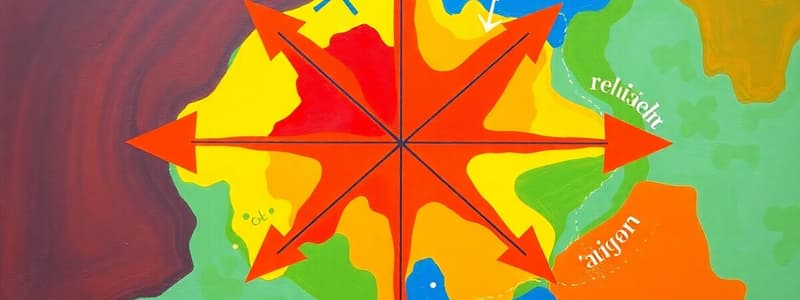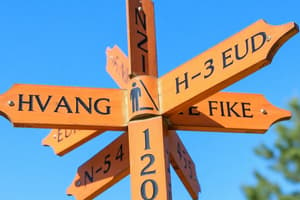Podcast
Questions and Answers
Which direction does the sun rise?
Which direction does the sun rise?
- East (correct)
- West
- South
- North
If North is to the right of East, which direction is to the left of East?
If North is to the right of East, which direction is to the left of East?
- South
- West (correct)
- Northeast
- North
What does '1 cm = 2 km' represent in mapping?
What does '1 cm = 2 km' represent in mapping?
- The height of buildings
- The length on the Earth
- The distance on the map (correct)
- The area covered
In which direction is the pond located relative to the oak tree?
In which direction is the pond located relative to the oak tree?
What is the opposite direction of the pond which is in the West?
What is the opposite direction of the pond which is in the West?
What is the total distance when adding 4 km, 8 km, 2 km, and 10 km?
What is the total distance when adding 4 km, 8 km, 2 km, and 10 km?
To find the distance from Bheem's uncle's house to Toofan's house on the scale, you need to sum which measurements?
To find the distance from Bheem's uncle's house to Toofan's house on the scale, you need to sum which measurements?
What device is primarily used to find cardinal directions?
What device is primarily used to find cardinal directions?
If the scale of a map is 1 cm = 5 km, how far is 13 cm on the map in kilometers?
If the scale of a map is 1 cm = 5 km, how far is 13 cm on the map in kilometers?
Which of the following is NOT a cardinal direction?
Which of the following is NOT a cardinal direction?
Which of the following is true regarding the scale values on a map?
Which of the following is true regarding the scale values on a map?
Between two maps displaying distances, which distance is longer given 15 cm in Map - 2 and 14 cm in Map - 1?
Between two maps displaying distances, which distance is longer given 15 cm in Map - 2 and 14 cm in Map - 1?
What measurement corresponds to 5 cm on the scale where 1 cm is equal to 2 km?
What measurement corresponds to 5 cm on the scale where 1 cm is equal to 2 km?
Flashcards are hidden until you start studying
Study Notes
Directions
- Directions indicate paths that show movement and orientation.
- Four cardinal directions: North, South, East, and West.
- Facing the sunrise indicates one is facing East; sunset indicates West.
- North is opposite South, and looking at a compass, North is to the right of East and South is to the left.
Compass
- A compass helps find cardinal directions using a magnetic needle.
- 'N' denotes North, 'S' South, 'E' East, and 'W' West.
- The sun's movement aids in determining East and West positions.
Map Scale
- Scale is used to represent real distances on maps, since exact distances can be challenging to depict.
- Example scale: "1 cm = 2 km" indicates that each centimeter on the map equals two kilometers in reality.
Distance Calculation
- When calculating distances between two points, add the total scale values.
- For example, if moving from Bheem Uncle's house to Toofan's house involves several path segments adding up to:
- 2 cm + 4 cm + 1 cm + 5 cm = 12 cm total.
- Using a scale of "1 cm = 2 km," the distances translate to:
- 2 cm = 4 km, 4 cm = 8 km, 1 cm = 2 km, 5 cm = 10 km, resulting in a total distance of 24 km.
Longest Road
- The road with the largest scale number represents the longest distance on a map.
- In mapped paths, always identify the largest number to determine the longest road.
Uses of Scale and Directions
- The scale is crucial for calculating true distances between locations on a map.
- Directions facilitate locating specific places accurately on a map.
Example Problems
- If a map scale indicates "1 cm = 5 km," then "13 cm" equates to:
- 13 cm × 5 km = 65 km.
- Comparing distances in different maps involves summing individual segments to find which map has the longest distance.
Studying That Suits You
Use AI to generate personalized quizzes and flashcards to suit your learning preferences.




